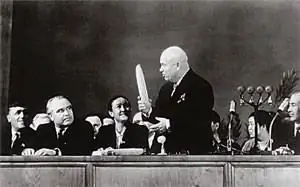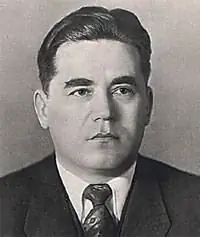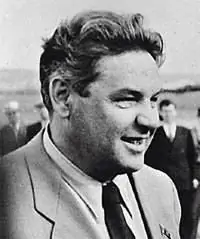- Author Matthew Elmers elmers@military-review.com.
- Public 2023-12-16 21:49.
- Last modified 2025-01-24 09:17.
The victims of the Khrushchev's repressions were large communist activists. Those who disagreed with the head of the USSR, primarily regarding the Stalinist legacy and the break with China, were removed from their posts, expelled from the CPSU, and exiled.
What is characteristic - after the resignation of Khrushchev, organized by his own creatures, the disgraced leaders were not reinstated in their former positions. It seems that Brezhnev's entourage also feared authoritative party members, believing that they would once again come to the fore.
The last of the Mohicans
One of the most notable among those who fell into disgrace from Khrushchev is Nuritdin Mukhitdinov. A native of an aul near Tashkent, he was the secretary of the Central Committee of the CPSU, chairman of the Foreign Affairs Committee of the Council of Nationalities of the Supreme Soviet of the USSR; earlier - the head of the Council of Ministers and the head of the Central Committee of the Communist Party of Uzbekistan. And before these posts he headed the Tashkent regional committee.
Mukhitdinov noted in the 80s that his relations with Khrushchev and his entourage deteriorated since 1957 as their destructive actions in domestic and foreign policy. He himself preferred to abstain from voting in the Central Committee in support of the relevant decisions. This did not go unnoticed.
Mukhitdinov asked Khrushchev to send him to an international meeting of the Communist Parties in Bucharest (in June 1960) in order to try to settle differences with the Communist Parties of China, Albania and other countries on the question of Stalin. But the first secretary went on his own and made insulting attacks on Beijing and Tirana. In Bucharest, Khrushchev advised the Romanian communists to think carefully and take into account the position of not only Moscow, but also Tito on this issue, before supporting China and Albania. All this aggravated the split in the world communist and national liberation movement.
In November - mid-December 1961, Mukhitdinov was stripped of all his posts and was soon expelled from the Central Committee of the CPSU. He paid for the categorical refusal of Khrushchev's proposed speech at the 22nd Party Congress in support of the removal of Stalin's sarcophagus from the Mausoleum. Mukhitdinov replied: “The peoples and communists of Central Asia will not accept this decision badly, since disturbing the peace of the deceased is considered a great sin in our country. And then, how much can you humiliate Stalin and the Stalinist period? This is our common history - the history of struggle, mistakes, but most importantly - victories of world significance. We will also take into account China's position on this issue."

Nuritdin Akramovich Mukhitdinov - holder of many military orders and medals, participated in the liberation campaign of the Red Army in Western Ukraine in September 1939, in the defense of Rostov-on-Don and Stalingrad. In the city on the Volga he was seriously wounded. In 1943 he received the military rank of colonel. But these merits were "forgotten" by the Khrushchev leadership. At the end of 1962, Mukhitdinov was removed from the Central Committee and appointed deputy chairman of the board of Tsentrosoyuz. This was essentially a cruel humiliation for an authoritative figure. But he withstood the blow, and moreover, he achieved the implementation of his proposals to increase the role of consumer cooperation in providing food and small agricultural implements to remote areas of the Union republics. For this, after the resignation of Khrushchev, he was awarded the Order of the Badge of Honor on the eve of November 7, 1965.
Subsequently, Mukhitdinov was promoted. In 1966-1968, he was the first deputy chairman of the State Committee for Cultural Relations with Foreign Countries under the USSR Council of Ministers, and from 1968 to 1977 - Ambassador to Syria. Hafez Assad, at his meetings with Soviet government delegations in Damascus and Moscow, always noted Mukhitdinov's extraordinary erudition, diplomatic talent and high culture. The ambassador refused to be evacuated from Damascus during the 1973 autumn war with Israel, moreover, he went to the front line. According to the author, in 1973-1975 Mukhitdinov was an intermediary in negotiations to normalize relations between Damascus and Baghdad. And since 1974, Iraq began to provide military-technical assistance to Syria.
The political weight of Mukhitdinov was approaching the previous level, this was supported by Kosygin, the head of the Council of Ministers of the USSR. But the aging Brezhnev and other members of the Politburo did not want the return of Stalin's nominees to their former roles. In 1977, Mukhitdinov was again demoted and appointed deputy chairman of the board of the USSR Chamber of Commerce and Industry. On March 11, 1985, two days before the funeral of Chernenko, the veteran was awarded the Order of the Patriotic War of the 2nd degree and from April of the same year he was sent to a retirement of federal significance. In December 1987, at the insistence of the leadership of the Uzbek SSR, Mukhitdinov was awarded the Order of the October Revolution. And then he moved to Tashkent, from where his thorny path to heights and opals began. Mukhitdinov worked as an adviser to the government of the Uzbek SSR, then headed the Society for the Protection of Historical and Cultural Monuments. He died in Tashkent at the end of August 2008, rightfully called "the last of the Stalinist Mohicans." Mukhitdinov far outlived all his comrades-in-arms who were subjected to Khrushchev's repressions.
Diehard economist
One of those whom Khrushchev cracked down on was Dmitry Shepilov, a prominent Soviet politician and economist. In 1957, he was officially named as having joined the anti-party group of Molotov, Malenkov, Kaganovich. The word "joined" immortalized the name of Shepilov in folk art.
In 1926, at the age of 21, he graduated with honors from the law faculty of Moscow State University. Lomonosov and the agrarian and economic faculty of the Institute of Red Professors. Since the late 1920s, he has published articles on intra- and inter-sectoral planning, inter-regional economic relations in Eastern Siberia and the Urals, defending the need for the development of processing industries on the ground, urging to take into account the local economic potential. Let us note that these problems are still relevant today. Shepilov also suggested analyzing the import needs of neighboring countries in order to cover them, if possible, by producing the necessary goods in the border Soviet regions. The latter was taken into account when providing economic assistance to Afghanistan, Iran, China, Mongolia, Tuva in the 1930s and 1950s, as well as for the development of trade between the Soviet Union and Poland and the Baltic states in the prewar period. And today an increasing volume of goods imported by the republics of the ex-USSR from Russia is produced in the regions of the Russian Federation neighboring these countries.

Since 1934, Shepilov has been working at the Institute of Economics of the USSR Academy of Sciences, receiving the title of professor. From 1935 - in the science department of the Central Committee of the party. From 1938 to June 1941 - Scientific Secretary of the Institute of Economics of the Academy of Sciences of the USSR.
As professor Shepilov had a reservation, but in the very first days of the war he volunteered for the Moscow militia. For five years in the army, he goes a phenomenal way from a private to a major general and head of the political department of the 4th Guards Army. Receives many combat awards.
Stalin knew how to appreciate those who were not afraid to defend their opinions and, like Zhukov, "stood their gaze." Dmitry Trofimovich was one of those. In 1946-1947 Shepilov was the editor of the propaganda department of the Pravda newspaper, since 1952 he was the editor-in-chief of the country's first newspaper. In 1953 he was elected a corresponding member of the USSR Academy of Sciences. The economic discussions of 1949-1950 and 1951-1952, organized at the initiative of Stalin, were prepared and conducted with the participation of Shepilov, who was one of the leaders of the organizing committees of these forums.
Their most important task was to identify ways of gradual reform of the planning and management system. In particular, proposals were put forward to "decouple" the ruble from the dollar, to reduce the number of mandatory targets, to expand the financial and economic independence of enterprises, and to facilitate their foreign trade activities. And even limit the interference of party committees in the economy.
The innovations of that time in Soviet economic practice became the prototype of the well-known "Kosygin" reforms of the 60s. But in the spring of 1953, these undertakings were curtailed. According to analysts, the nomenclature prevented the development of economic and managerial reforms, fearing for their positions and "food and property welfare."
Chinese researcher Ma Hong noted: “Since Stalin, in his last book, The Economic Problems of Socialism in the USSR, 1952, indicated that he had no objection to Shepilov’s comments on the draft textbook on political economy, Shepilov was expected to become the de facto leader of Soviet economic policy and oversee economic science in the USSR. But later he began to increasingly object to the new leadership of the country. Criticizing, for example, the methods of developing virgin lands, the sale of machine and tractor stations to collective farms, which turned the former into chronic debtors of the state; the widespread planting of corn, the price policy, the monetary reform of 1961”.

Later, Shepilov spoke out against increasing the export of Soviet raw materials, fearing that by doing so, the USSR would eventually turn into a resource colony of the West. He believed that objective criticism and correction of the mistakes of the "personality cult" should not be replaced by indiscriminate defamation of Stalin, because this would only demoralize Soviet society and lead to a split between the socialist countries and the communist parties. The forecasts, alas, came true.
Shepilov set out his opinion in detail at the plenum of the Central Committee of the party in June 1957, accusing Khrushchev of establishing his own "personality cult." And in fact he supported Molotov, Malenkov, Bulganin, and other members of the Presidium of the Central Committee, who spoke in favor of the resignation of the first secretary. But they were clearly late with his dismissal, for he managed to secure the support of the majority of the members of the Central Committee, the composition of which has been renewed by more than 70 percent since March 1953.
The consequences of the political defeat were not long in coming. Shepilov held important posts: Secretary of the CPSU Central Committee, candidate member of the Presidium of the Central Committee and Minister of Foreign Affairs. He was dismissed from all party and government posts. In July 1957 he was appointed director of the Institute of Economics of the Academy of Sciences of the Kyrgyz SSR. But soon, realizing themselves, they were demoted to deputy director.
Under the leadership of Shepilov, the institute developed a long-term intersectoral balance for all the republics of Central Asia. The document noted that the distortions in the region's economy that began in the late 1950s and its focus on raw materials industries (especially cotton growing) will lead to an increase in subsidies from the center, an increase in socio-political, interethnic tensions, and in the future - to political consequences. The region is likely to get out of the control of the leadership of the USSR and all-union structures. The danger of anti-scientific, harmful methods of using the waters and fish resources of both Lake Balkhash, the Aral Sea, and the rivers flowing into these basins (Ili, Syrdarya, Amu Darya) was noted. These predictions were also destined to come true.
It seems that these studies were the last straw that overflowed the patience of the "Khrushchev elite". In 1959, Shepilov was stripped of the title of Corresponding Member of the Academy of Sciences of the USSR, removed from the post of Deputy Director of the Institute of Economics of the Academy of Sciences of Kyrgyzstan, and in April 1962 he was expelled from the party.
This was followed by nearly two decades of virtual oblivion. Although, according to some reports, members of the Brezhnev Politburo Kosygin, Katushev, Mazurov, Masherov, Kulakov suggested returning Shepilov at least to economic science, for example, to the position of director of any research institute under the Academy of Sciences, the Council of Ministers or the State Planning Committee of the USSR. But the publication of some of his economic works in China, Yugoslavia and Romania alarmed the conservative wing of the USSR leadership. Shepilov was reinstated in the party only in March 1976, and in the rank of Corresponding Member of the USSR Academy of Sciences - 15 years later, in March 1991.
The authority and professionalism of the economist was feared both in the country's leadership and in ideological and scientific-economic circles close to the Kremlin. Therefore, after his reinstatement in the CPSU, he was not returned either to the Central Committee or to other governing structures. From the fall of 1960 to the fall of 1982, he worked only as an archeographer in the Main Archive Directorate of the Union Council of Ministers.
Even after his reinstatement in the party, Shepilov was refused publication in Soviet economic journals. His requests for a meeting with Brezhnev, Kosygin, Baybakov, ministers of the government of the USSR and the union republics were rejected. It is known that Shepilov sent Chernenko and Gorbachev his views on reforming the Soviet economic and administrative system, based on economic discussions of the late 40s - early 50s and on the Kosygin reforms. But the first did not have time to delve into these proposals, and the authorities were not up to Shepilov's initiatives during perestroika.






